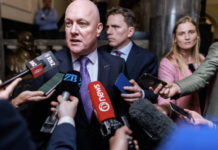It’s getting round to that time of the year when teachers are starting to consider what they’re going to write on pupils end of year reports.
Perhaps it’s something we should do for our politicians, especially cabinet ministers, government departments, and others who are supposed to provide services for the public.
Given the current inflation crisis and its contribution to it, we should start with the Reserve Bank and its governor, Adrian Orr, especially as he has just been reappointed for another five year term.
In 2020, when the need to support incomes became patently clear, the government stepped in with its wage subsidy scheme. Helicopter money and other income support options were floated.
Economists like Ganesh Nana, now head of the Productivity Commission, and Geoff Bertram, politicians like Jim Bolger and former Finance Minister Michael Cullen, and commentators like Bernard Hickey, were all proposing ideas that just a few short months earlier would have been unthinkable. (More here – https://www.socialcredit.nz/quotesfromeconomistsandexperts)
Those ideas were not unknown, or untried, just not talked about in the Neo Liberal economic environment our economy has been operating in.
Milton Friedman, one of the main regurgitators of that line of economic thinking (the world had tried it before in the late nineteenth century. It was an abject failure then too.) said “Only a crisis – actual or perceived – produces real change. When that process occurs the actions that are taken depend on the ideas that are lying around”.
Ideas were indeed “lying around”, and had been tried successfully in New Zealand, Australia, Canada and other countries before and the crisis was now providing the opportunity for them to be discussed.
In New Zealand the Labour government of 1935 used the Reserve Bank to fund the building of 33,000 state houses, and a 1% overdraft for the country’s producer boards – at no cost to taxpayers.
In Canada in October 2011 the Bank of Canada announced its intention to increase from 15% to 20% its purchases of government bonds direct from the government – essentially creating money for the government of Canada.
Reserve Bank governors across the world are known for being conservative, not wanting to utter anything that would ‘spook the markets’ (although why the country’s financial elite should be more important than the majority of the population is never explained).
Yet in that ‘actual or perceived crisis’ our relatively new governor was leading the charge with those ideas that were ‘lying around’.
In an interview with Bloomberg in April 2020 he said “Direct monetization (the Reserve Bank funding the government directly), I know, has been heresy, taboo for a long time, but it’s only a long time in our lifetime.” “It’s not a mysterious issue. It’s just not how we’ve run the business.”
And in a Radio NZ interview he said “Being able to do the helicopter kind of money concept would be around being able to inject cash into the system. That sounds quite exciting”.
The report card at that point would have read ‘Shows potential, understands concepts that could usefully be developed’.
Despite all those ideas that were ‘lying around’ and being discussed, and the unsolicited aide memoir titled “Quantitative Easing and Monetary Financing Compared” (authored in conjunction with the Treasury) which it provided to the Finance Minister in May 2020, the Bank stepped in with its orthodox Quantitative Easing programme following the same path most other central banks did.
It did so even though the aide memoir it had authored recommended that Monetary Finance (funding the government directly – as Canada had done) could be used to “meet specific funding needs of the Government at lower cost and with greater certainty than QE”.
As the report flagged, that decision to go with QE rather than Monetary Finance meant significantly higher costs for taxpayers – $7.2 billion in premiums paid to the banks to get them to sell their government bond holdings, $6 billion in unnecessary interest payments on borrowing from the commercial banks, and $1.5 billion annually in interest payments to the banks at the increasing OCR rate on the money sitting in their reserve accounts.
How many nurses, doctors, midwives, psychologists, teachers, hospitals, schools, and state houses would that fund?
QE drove the insane rise in house and other asset prices and was a major contributor to the inflation we’re now suffering.
The report card now reads ‘potential unrealised, could have done much better’.
Sad, because if Orr had pursued Monetary Finance with as much vigour as he is pursuing turning the Bank into a climate responsive Maori clothed entity we would not need to have the OCR at 3.5 percent, mortgage rates at 6 percent, inflation at 8 percent, and thousands on waiting lists for hospital treatment and state houses.
In New Zealand’s case Milton Friedman was wrong when he said “Only a crisis – actual or perceived – produces real change”.
It didn’t.
Adrian Orr can take a large part of the responsibility for that.
Former Australian Treasurer, Paul Keating, in a letter to Australian media in September 2020, hit the nail on the head.
He criticised Australian Reserve Bank officials for lacking the courage to break with economic orthodoxy to allow monetary financing of deficit spending, and said they were too concerned about what other central bankers would think if Australia went down that path.
“Buying bonds directly from Treasury — wash your mouth out on that one — what would they say about us at the annual Bank for International Settlements meeting in Basel?”
The same accusation could be levelled at Adrian Orr and our central bank – even though it put that option on the table.
Chris Leitch – Leader of Social Credit





Thank you for putting into words what I was trying to say for the last 3 years Monetary Finance. Why doesn’t the government just give money to itself.? If banks can create money/credit so can the government.
That’s what Govt did for millennia and is part of the reason why we had no tax (as we would understand tax) in those days.
A LOT of our tax money goes to paying (to privately owned banks) the interest on money our Govt borrows from then, INSTEAD of creating it itself.
D’Oh !!!!! INSANE and THE biggest problem we need to resolve as EVERYTHING else invariably falls into line and is solved if our own Govt created the money instead of privately owned banks.
keriman, no tax just a 10percent tithe to the church and whatever to the lord of the manor wanted for the use of the land.
Adrian Orr won the Golden Piggy award from the Taxpayers Union for the most egregious waste of money.
In an era of willful financial negligence by government, he topped the bill.
“the Taxpayers Union”
A right wing off shoot of the National party.
What is the unions experience in finance?
Since you asked, their board includes:
>A former CEO of the New Zealand Institute of Economic Research,
> A former Minister of Finance
> A former civil servant with a Masters degrees in economics in public policy from the Australian National University and from the National Graduate Institute for Policy Studies in Tokyo respectively.
https://www.taxpayers.org.nz/our_team
All right wing patsies since you asked. Nothing unusual for you to think that they are balanced in their dislike for Orr.
Why do you rate their opinion above Orr I wonder?
From 1997 to 2000 he was chief manager of the Economics Department of the Reserve Bank of New Zealand.[4]
He has worked as an economist at the OECD, the New Zealand Treasury, and was Chief Economist for the New Zealand National Bank and Westpac Bank (2000–2003).[1]
From 2003 to 2007 he was Deputy Governor and Head of Financial Stability at the Reserve Bank.[5][4]
NZ Super Fund
Edit
In 2007 he was appointed Chief Executive of the New Zealand Superannuation Fund (the NZ Super Fund).[1][6] Orr said he enjoyed the job’s “beautiful mix [of] big, long-term, intergenerational challenges — and its hard-edge economics and finance.”[2]
He has a Bachelor of Social Sciences (Economics and Geography) from the University of Waikato, and a master’s degree in development economics (with distinction) from the University of Leicester, England.[1][3]
Since you asked.
Um, he didn’t ask.
Um, what?
so andrew you’re confirming they’re neo-lib sock puppets.
Not forgetting the Taxpayers Union which mimics the Tories Taxpayers Alliance in the U.K had its hand out for Govt subsidies….!Very flexible of them and their…principles.
Social Credit has always been ahead of the game. Modern Monetary Theory, by whatever name you wish to call it, is the way for sovereign governments to use their fiscal capability ( mea culpa Bill Mitchell if I am getting things a bit wrong). But let us not be confused by thinking that such financing is the Central (Reserve) Bank coming to the rescue of a government. The government is the one in charge and Central Bank independence is a convenient fiction. The supposed technical independence should be ended.
So Social Credits policies were not ‘funny money’…after all.
Milton Friedman also advocated injecting fiat money into the economy though being of a neoliberal bent he was somewhat stingy with the amounts. He also advocated offseting this by imposing a 100% reserve ratio on the trading banks. This would have stopped them lending out money that in theory belonged to the demand depositors, and thereby increasing the money supply. I’m not sure though what this would have done to interest rates if businesses wanted to continue borrowing from the trading banks.
Adrian Orr has achieved the lowest inflation in the world (lower than Australia), record low unemployment, record exports (and profits for business), kept Aotearoan’s in employment, kept businesses active and all other numbers are favorable so why should he be sacked. Typical Tory media beat up and retro Joe fools. NZ has had the best economy in the last 3 years despite a global pandemic and associated economical disruption. Other Countries especially the right wing/tory governments have been ended up with massive deaths and economic hardship.
All good but he he still has work to do… there 140,000 kiwis unemployed and underemployed.
The unemployed in this country are by and large unemployable.
Please define “unemployable”
Does that include overqualified, over 50 of age,
those with achievement record that exposes inadequacy of others, those who do not care about rugby or cricket?
So often employers require “excellent written and verbal communication skills” – meaning : “No effing migrants”.
Spot on again, the right will screech from the roofs at this post. He is also responsible for bringing down house prices so no complaints from anyone for that financial correction.
Man who starts fire puts it out 30%. Wow, hero.
Current world inflation rates.
About 80 countries have lower inflation than NZ’s 7.2%.
https://tradingeconomics.com/country-list/inflation-rate?continent=world
We should assume your other statements are equally factual.
And ahead of 121 including Australia and the USA, Ireland, Singapore, South Africa etc.
Good stat Alan M but completely irrelevant.
Adrian Orr is king gaslighter, pretending to care about Maori whilst making life hardest for renters and wannabe home owners. The man is one cruel sick puppy.
In New Zealand’s case Milton Friedman was wrong when he said “Only a crisis – actual or perceived – produces real change”.
NZ wants to forge its own way into hell. Don’t tell us to evaluate the best procedure – we know instinctively what to do. We boldly go where no man has tread, and create our own crisis – so there!
In 2020, when the need to support incomes became patently clear, the government stepped in with its wage subsidy scheme. Helicopter money and other income support options were floated.
Economists like Ganesh Nana, now head of the Productivity Commission, and Geoff Bertram, politicians like Jim Bolger and former Finance Minister Michael Cullen, and commentators like Bernard Hickey, were all proposing ideas that just a few short months earlier would have been unthinkable. (More here – https://www.socialcredit.nz/quotesfromeconomistsandexperts)
Those ideas were not unknown, or untried, just not talked about in the Neo Liberal economic environment our economy has been operating in.
Milton Friedman, one of the main regurgitators of that line of economic thinking (the world had tried it before in the late nineteenth century. It was an abject failure then too.) said “Only a crisis – actual or perceived – produces real change. When that process occurs the actions that are taken depend on the ideas that are lying around”.
It’s near Christmas – if employment feelers are out for Father Christmases, Mr Orr would be most suitable as one with the right cheery, rosy look. He may not carry out his duties very thoroughly and fairly though, only taking gifts to the best houses, and leaving vouchers with a ‘huge 50% discount’ for Boxing Day sales for the rest.